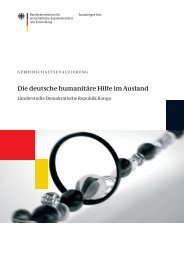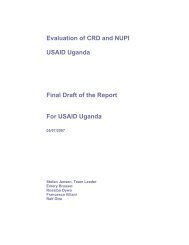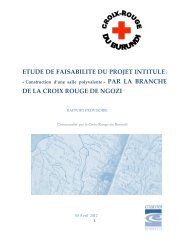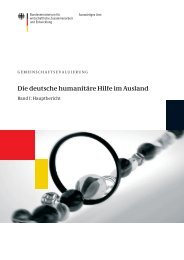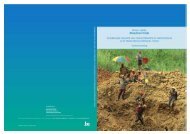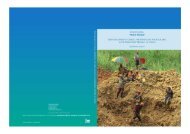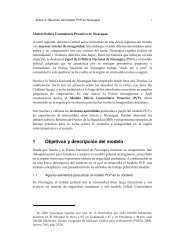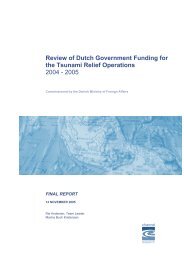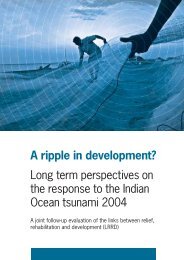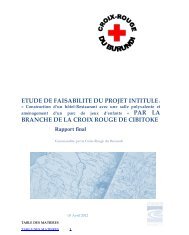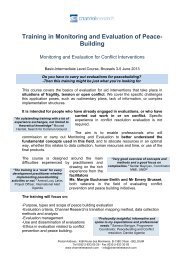German Humanitarian Aid Abroad - Channel Research
German Humanitarian Aid Abroad - Channel Research
German Humanitarian Aid Abroad - Channel Research
You also want an ePaper? Increase the reach of your titles
YUMPU automatically turns print PDFs into web optimized ePapers that Google loves.
Executive Summary<br />
Background, approach and<br />
methodology of the evaluation<br />
In the context of the evaluation of the<br />
<strong>German</strong> humanitarian assistance abroad,<br />
commissioned by the Auswärtiges Amt<br />
(AA – Federal Foreign Office) and the<br />
Bundesministerium für wirtschaftliche<br />
Zusammenarbeit und Entwicklung (BMZ –<br />
Federal Ministry for Economic Cooperation<br />
and Development), the country case study<br />
Uganda was conducted as a pilot study<br />
from May to beginning of September 2010.<br />
The field mission with a more detailed<br />
evaluation of project case studies took<br />
place between 13 June and 03 July 2010.<br />
Objective, object and period of the<br />
evaluation<br />
The objective of the evaluation is to<br />
undertake an independent, comprehensive<br />
analysis and assessment of <strong>German</strong>y’s<br />
humanitarian assistance abroad, in order<br />
to gain insights which can be used for<br />
management by the two ministries<br />
concerned. A further purpose is<br />
accountability towards parliament. The<br />
following issues have been considered in<br />
particular<br />
(1) relevance and results of the<br />
interventions<br />
(2) interface management between the<br />
two ministries – AA and BMZ,<br />
(3) coordination and complementarity with<br />
interventions by other donors, especially<br />
the EU and UN organisations,<br />
(4) appropriateness of the financing<br />
channels and<br />
(5) linking up emergency relief, emergency<br />
and transitional aid, reconstruction and<br />
development cooperation in line with the<br />
LRRD approach (Linking Relief,<br />
Rehabilitation and Development).<br />
xiii<br />
In addition, recommendations are to be<br />
provided for possible improvements.<br />
The object of the evaluation is the<br />
humanitarian assistance provided by the<br />
AA and BMZ from 2005 to 2009 and<br />
ongoing aid interventions. At the forefront<br />
of the evaluation are the humanitarian<br />
emergency assistance of the AA and the<br />
development-oriented emergency and<br />
transitional aid of the BMZ, which have<br />
been evaluated in greater depth on the<br />
basis of six country case studies (Darfur<br />
(Sudan), DR Congo (East), Haiti,<br />
Myanmar, Chad and Uganda). Other<br />
interventions by the AA and interventions<br />
by the BMZ for reconstruction and<br />
(government and non-governmental)<br />
development cooperation have been<br />
included with a view to assessing internal<br />
coherence and alignment with the LRRD<br />
concept (linking emergency relief,<br />
emergency and transitional aid,<br />
reconstruction and development<br />
cooperation). Earmarked contributions to<br />
international organisations have also been<br />
included in the evaluation, but assessed<br />
primarily on the basis of reports and<br />
evaluations conducted by the respective<br />
organisation itself.<br />
The results of the case study Uganda are<br />
integrated into the synthesis report of the<br />
evaluation together with the results of the<br />
other country case studies.<br />
Design and methodology of the<br />
evaluation<br />
Based on the evaluation matrix and project<br />
case studies selected for a more detailed<br />
analysis (implemented by Arbeiter-<br />
Samariter-Bund, Diakonie Katastrophenhilfe,<br />
Deutsches Rotes Kreuz, Welthungerhilfe,<br />
Deutsche Gesellschaft für<br />
Technische Zusammenarbeit, the United<br />
Nations High Commissioner for Refugees<br />
and the World Food Programme), a mix of



